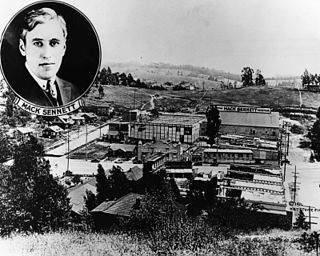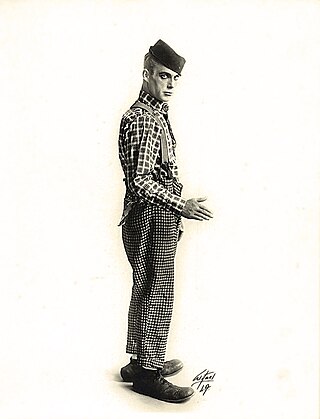
The Keystone Cops are fictional, humorously incompetent policemen featured in silent film slapstick comedies produced by Mack Sennett for his Keystone Film Company between 1912 and 1917.

Mack Sennett was a Canadian-American producer, director, actor, and studio head who was known as the "King of Comedy" during his career.

Tillie's Punctured Romance is a 1914 American silent comedy film directed by Mack Sennett and starring Marie Dressler, Mabel Normand, Charlie Chaplin, and the Keystone Cops. The picture is the first feature-length comedy and was the only feature-length comedy made by the Keystone Film Company.

Keystone Studios was an early film studio founded in Edendale, California on July 4, 1912 as the Keystone Pictures Studio by Mack Sennett with backing from actor-writer Adam Kessel (1866–1946) and Charles O. Baumann (1874–1931), owners of the New York Motion Picture Company. The company, referred to at its office as The Keystone Film Company, filmed in and around Glendale and Silver Lake, Los Angeles for several years, and its films were distributed by the Mutual Film Corporation between 1912 and 1915. The Keystone film brand declined rapidly after Sennett went independent in 1917.

Mack Swain was a prolific early American film actor, who appeared in many of Mack Sennett’s comedies at Keystone Studios, including the Keystone Cops series. He also appeared in major features by Charlie Chaplin and starred in both the world's first feature length comedy and first film to feature a "movie-within-a-movie" premise.

Ford Sterling was an American comedian and actor best known for his work with Keystone Studios. One of the 'Big 4', he was the original chief of the Keystone Cops.

Henry Lehrman was an American actor, screenwriter, director and producer. Lehrman was a very prominent figure of Hollywood's silent film era, working with such cinematic pioneers as D. W. Griffith and Mack Sennett. He directed, as well as co-starred in, Charlie Chaplin's first film, Making a Living.

The Knockout is a 1914 American silent comedy film starring Roscoe "Fatty" Arbuckle. It also features Charlie Chaplin in a small role, his seventeenth film for Keystone Studios. It is one of only a few films in which Chaplin's Little Tramp character appears in a secondary role, not appearing until the second half of the film. It also stars Arbuckle's wife, Minta Durfee, Edgar Kennedy and Keystone owner, Mack Sennett in a minor role as a spectator. The film was directed by Charles Avery.
Edendale is a historical name for a district in Los Angeles, California, northwest of Downtown Los Angeles, in what is known today as Echo Park, Los Feliz and Silver Lake. In the opening decades of the 20th century, in the era of silent movies, Edendale was known as the home of most major movie studios on the West Coast. Among its many claims, it was home to the Keystone Cops, and the site of many movie firsts, including Charlie Chaplin's first movie, the first feature-length comedy, and the first pie-in-the-face. The Edendale movie studios were mostly concentrated in a four-block stretch of Allesandro Street, between Berkeley Avenue and Duane Street. Allesandro Street was later renamed Glendale Boulevard.

The Little Billy films are a series of short films produced by Keystone Studios, revolving around the character of a small boy, portrayed by Paul "Little Billy" Jacobs.

Alice Howell was a silent film comedy actress from New York City. She was the mother of actress Yvonne Howell.

Tango Tangles is a 1914 American film comedy short starring Charles Chaplin and Roscoe Arbuckle. The action takes place in a dance hall, with a drunken Chaplin, Ford Sterling, and the huge, menacing, and acrobatic Arbuckle fighting over a girl. The supporting cast also features Chester Conklin and Minta Durfee. The picture was written, directed and produced by Mack Sennett for Keystone Studios and distributed by Mutual Film Corporation.

In the Clutches of the Gang is a 1914 American short comedy film featuring Roscoe Arbuckle and the Keystone Cops. The majority of the film is believed to be lost. However, a fragment of the film exists and is held by the Academy of Motion Picture Arts and Sciences. This film is considered to be a "high point" for the Keystone Cops, as the entire movie focuses on the slapstick police force.

A Thief Catcher is a one-reel 1914 American comedy film, produced by Mack Sennett for his Keystone film company, directed by Ford Sterling, and starring Sterling, Mack Swain, Edgar Kennedy, and Charles Chaplin as a Keystone Cop.
Richard Smith, also known as Dick Smith, was a screenwriter, actor, and film director. Smith was born in Cleveland, Ohio, and became a comedian active in the vaudeville era. He met his wife Alice Howell in 1910 and the two performed together as Howell and Howell. After working under direction of Mack Sennett at the American Mutoscope and Biograph Company in New York City, Smith moved to Los Angeles, California. Smith and his wife starred in reels together produced by L-KO Kompany.

Al St. John (1893–1963) was an American comic actor who appeared in 394 films between 1913 and 1952. Starting at Mack Sennett's Keystone Film Company, St. John rose through the ranks to become one of the major comedy stars of the 1920s, though less than half of his starring roles still survive today. With the advent of sound drastically changing and curtailing the two-reel comedy format, St. John diversified, creating a second career for himself as a comic sidekick in Western films and ultimately developing the character of "Fuzzy Q. Jones", for which he is best known in posterity.

Charles O. Baumann was an American film producer, film studio executive, and pioneer in the motion picture industry.

Frank D. Williams was a pioneering cinematographer who was active in the early days of the motion picture industry. He developed and patented the traveling matte shot.

Peggy Pearce was an American film actress of the silent era. She worked primarily in short subjects at the L-KO Kompany and Keystone Studios. She appeared alongside stars including Charles Chaplin, Roscoe Arbuckle, Billie Ritchie, Slim Summerville, Ford Sterling, and Mabel Normand.

At It Again is a 1912 American short silent comedy film produced and directed by Mack Sennett. The film stars Fred Mace, Mack Sennett, Ford Sterling, Mabel Normand and Alice Davenport.



















